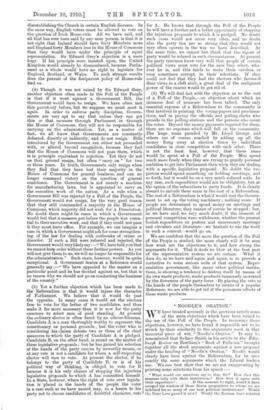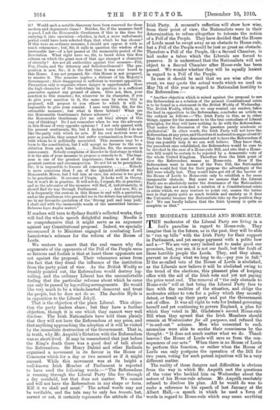" NOODLE'S ORATION."
WE have treated seriously in the previous article some of the main objections which have been raised to the use of the Poll of the People. In reviewing those objections, however, we have found it impossible not to be struck by their similarity to the arguments used in that immortal piece of wit, " Noodle's Oration." It may ba remembered that Sydney Smith in his article in the Edin- burgh Review on Bentham's " Book of Fallacies " brought together all the stock arguments against a new proposal under the heading of " Noodle's Oration." Noodle would clearly have been against the Referendum, for he uses exactly the same arguments which the Liberal leaders use. We can best show that we are not exaggerating by printing some selections from his speech :- " What would our ancestors say to this, Sir? How e0'23 this measure tally with their institutions ? How does it agree with their experience 2 If this measure be right, would it have escaped the wisdom of those Saxon progenitors to whom we are indebted for so many of our best political institutions ? Would the Dane have passed it over? Would the Norman have rejected
it? Would such a notable discovery have been reserved for these modern and degenerate times ? Besides, Sir, if the measure itself is good, I ask the Honourable Gentleman if this is the time for carrying it into execution—whether, in fact, a more unfortunate period could have been selected than that which he has chosen? If this were an ordinary measure, I should not oppose it with so much vehemence ; but, Sir, it calls in question the wisdom of an irrevocable law—of a law Passed at the memorable period of the Revolution. What right have we, Sir, to break down this firm column on which the great men of that age stamped a character of eternity? Are not all authorities against this measure—Pitt, Fox, Cicero, and the Attorney and Solicitor-General ? The pro- position is new, Sir; it is the first time it was ever heard in this House. I am not prepared, Sir—this House is not prepared, to receive it. The measure implies a distrust of his Majesty's Government; their disapproval is sufficient to warrant opposition. Precaution only is requisite where danger is apprehended. Here the high character of the individuals in question is a sufficient guarantee against any ground of alarm. Give not, then, your sanction to this measure; for, whatever be its character, if you do give your sanction to it, the same man by whom this is proposed, will propose to you others to which it will be impossible to give your consent. I care very little, Sir, for the ostensible measure ; but what is there behind ? What are
the Honourable Gentleman's future schemes ' Was the Honourable Gentleman (let me ask him) always of this way of thinking? Do I not remember when he was the advocate in this House of very opposite opinions ? I not only quarrel with his present sentiments, Sir, but I declare very frankly I do not like the party with which he acts. If his own motives were as pure as possible, they cannot but suffer contamination from those with whom he is politically associated. This measure may be a boon to the constitution, but I will accept no favour to the con-
stitution from such hands Besides, Sir, the measure is unnecessary. Nobody complains of disorder in that shape in which it is the aim of your measure to propose a remedy to it. The busi- ness is one of the greatest importance; there is need of the greatest caution and circumspection. Do not let us be precipitate, Sir; it is impossible to foresee all consequences Nobody is more conscious than I am of the splendid abilities of the Honourable Mover, but I tell him at once, his scheme is too good to be practicable. It savours of Utopia. It looks well in theory, but it won't do in practice. It will not do, I repeat, Sir, in practice ; and so the advocates of the measure will find, if, unfortunately, it should find its way through Parliament And now, Sir, as it is frequently the custom in this House to end with a quotation, and as the gentleman who preceded me in the debate has anticipated me in my favourite quotation of the Strong pull and long pull,' I shall end with the memorable words of the assembled barons- Nolumus leges Anglia mutari."
If readers will turn to Sydney Smith's collected works, they will find the whole speech delightful reading. Noodle is so comprehensive that it might serve as an argument against any Constitutional proposal. Indeed, we specially recommend it to Ministers engaged in combating Lord La.nsdowne's schemes for the reform of the House of Lords.
We venture to assert that the real reason why the arguments of the opponents of the Poll of the People seem so fatuous and foolish is that at heart those opponents are not against the proposal. Their vehemence arises from the fact that they dread the influence of the institution from the party point of view. As the British Weekly so frankly pointed out, the Referendum would destroy log- rolling, and the ordinary Liberal has the uncomfortable feeling that the particular reforms about which he cares can only be passed by log-rolling arrangements. He would like very much to be a whole-hearted democrat and trust the people, but he dare not do so. The Jacobin Hyde is in opposition to the Liberal Jekyll.
That is the objection of the plain Liberal. This objec- tion the party leaders share ; but they have a further objection, though it is one which they cannot very well disclose. The Irish Nationalists have told them plainly that they will not have the Referendum at any price, and that anything approaching the adoption of it will be visited by the immediate destruction of the Government. That is, in truth, why Mr. Asquith's flirtation with the Referendum was so short-lived. It may be remembered that just before the King's death there was a good deal of talk about the Referendum. Sir Henry Dalziel and other Radicals organised a movement in its favour in the House of Commons which for a day or two seemed as if it might succeed. While this movement was at its height a well-known Irish Member of Parliament is reported to have used the following words :—" The Referendum is running through the Liberal Party like fire through a dry cornfield, but that does not matter. We cannot and will not have the Referendum in any shape or form. Kill it we shall and must." The actual words may not be verifiable, and the tale may be only ben trovato, but, correct or not, it certainly represents the attitude of the Irish Party. A moment's reflection will show how wise, from their point of view, the Nationalists were in their determination to refuse altogether to tolerate the notion of a Poll of the People. They have decided that the House of Lords must be swept away as an obstacle to Home-rule, but a Poll of the People would be just as great an obstacle. Therefore a Poll of the People, like a Second Chamber, is laid under a taboo which the Liberals are forced to preserve. It is understood that the Nationalists will not object to a Second Chamber after Home-rule has been passed. We wonder whether they will be equally lenient in regard to a Poll of the People. In case it should be said that we are wise after the event, we may quote the actual words which we used on May 7th of this year in regard to Nationalist hostility to the Referendum :— " Another objection which is raised against the proposal to use the Referendum as a solution of the present Constitutional crisis is to be found in a statement in the British Weekly of Wednesday. The British Weekly, which, as we may remind our readers, takes the lead in opposition to the Referendum, concludes an article on the subject as follows :=The Irish Party in this, as in other things, appear for the moment to be the true custodians of Liberal principles, for they will have nothing to do with the Referendum. That makes the discussion of the question purely academic or gladiatorial.' In other words, the Irish Party will not have the Referendum at any price, and therefore it is absurd to argue about it! That the Irish Party are determined not to have the Referendum if they can possibly help it we can well believe. They know that, the precedent once established, the Referendum would be sure to be invoked in the case of a Home-rule Bill, and also that a Home- rule Bill would be certain to be rejected by a democratic vote of the whole United Kingdom. Therefore from the Irish point of view the Referendum means no Home-rule. Even if the Referendum went in favour of the Veto Bill, the Nationalist leaders would feel that for their purpose the advantages of the Bill were wholly lost. They would have got rid of the barrier of the House of Lords to Home-rule only to establish a far more insuperable obstacle. But must we assume that the Liberal Party are so absolutely under the dominance of the Nationalists that they dare not even find a solution of a Constitutional crisis (a crisis which, we may venture to point out, causes the better men in that party quite as much trouble and anxiety as it does the Unionists) because the Nationalists take up the position they do? We can hardly believe that the Irish tyranny is quite so complete as that."



























































 Previous page
Previous page